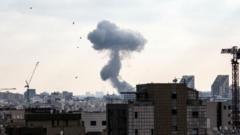The recent strikes ordered by President Trump against Iran's nuclear facilities have prompted backlash from both sides of the political spectrum, raising questions about the legality of his actions and fears of escalating conflict.
Tensions Rise as Trump's Strikes Against Iran Ignite Debate on War Powers

Tensions Rise as Trump's Strikes Against Iran Ignite Debate on War Powers
President Trump's military action against Iran has sparked controversy over his authority and potential implications for U.S. foreign policy.
Before launching military strikes on Iran’s nuclear facilities, President Trump did not consult Congress, leading to widespread debate over the constitutional authority regarding war declarations. The strikes, which some legislators view as an act of war, have drawn criticism from various political figures, including several Democrats and some Republicans.
Despite the pushback, Trump administration officials defended the action, categorizing it as a limited strike aimed solely at curtailing Iran’s nuclear capabilities. Secretary of State Marco Rubio asserted on Fox News that this did not constitute a war against Iran. Vice President JD Vance echoed similar sentiments, insisting that Trump had the authority to act to prevent further proliferation of weapons.
However, Trump's online comments hinted at a broader military ambition, suggesting potential regime change in Iran if the current government fails to meet his vision of reviving the nation. This shift in rhetoric has raised alarms among policymakers, who warn that a retaliatory response from Iran could quickly escalate the situation, putting American lives at risk.
The controversy is set against the backdrop of numerous bipartisan attempts to impose stricter constraints on presidential military actions, a reactive stance stemming from previous U.S. military entanglements in the Middle East. The sudden nature of the strikes has raised concerns over the lack of public and legislative discourse on the U.S.'s involvement in a turbulent region, a situation that could further destabilize international relations.






















